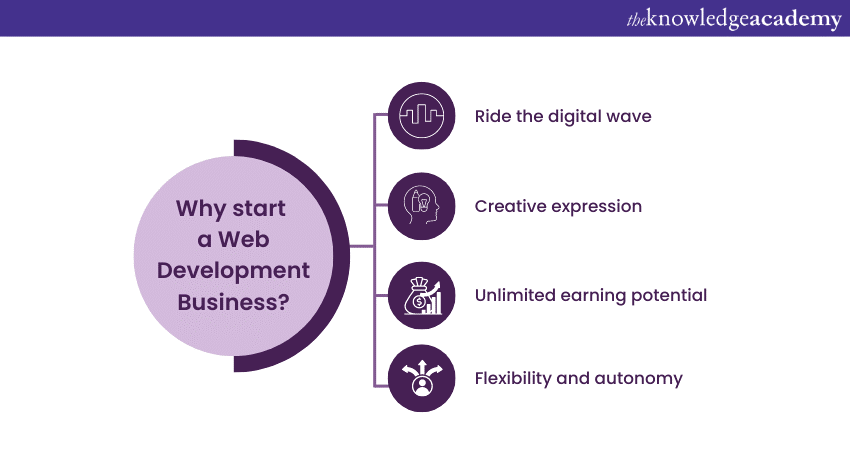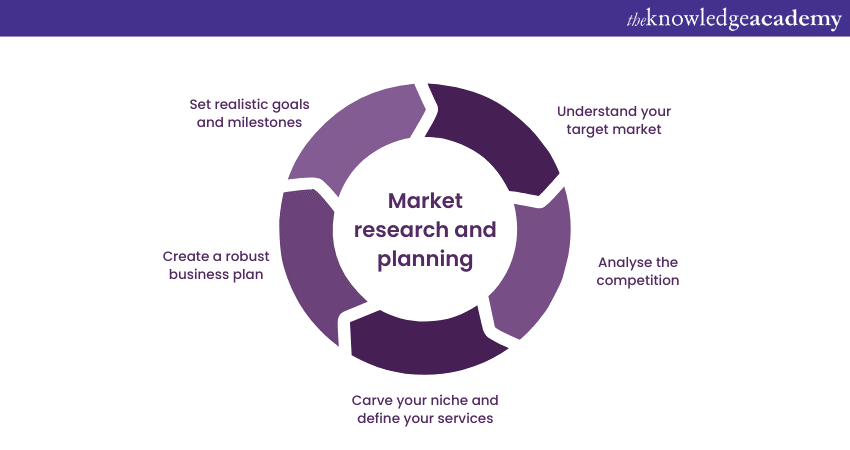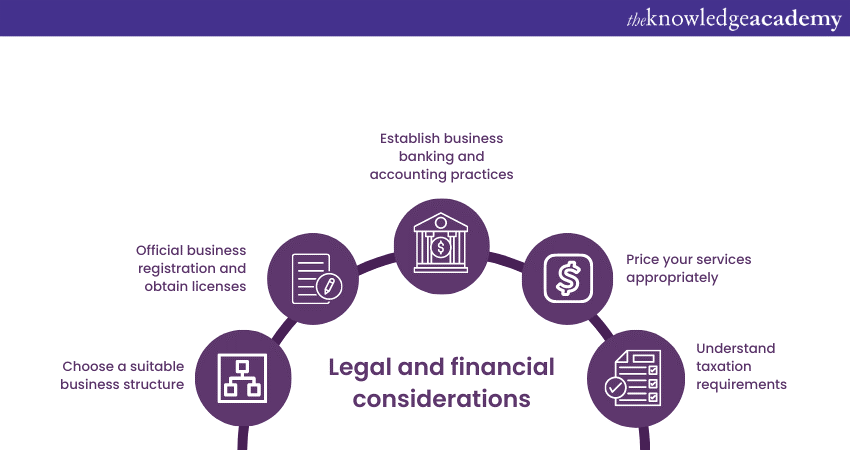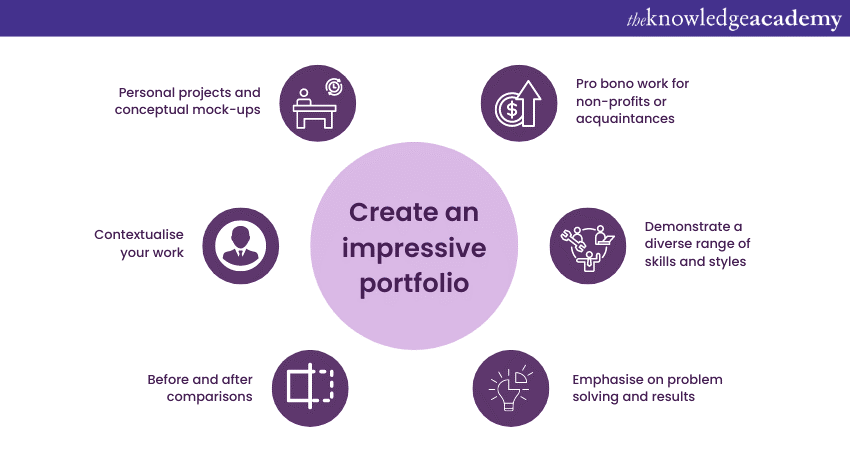We may not have the course you’re looking for. If you enquire or give us a call on 01344203999 and speak to our training experts, we may still be able to help with your training requirements.
Training Outcomes Within Your Budget!
We ensure quality, budget-alignment, and timely delivery by our expert instructors.

Are you interested in launching a Web Design Business? You are in the right spot. This comprehensive blog will walk you through the essential steps to establish your Web Development Business. We have covered everything for you, from laying out the fundamental plans to attracting your initial web design clientele. In this blog, we will explore How to Start a Web Development Business and discuss several aspects from market research to scaling your business.
Table of Contents
1) Why start a Web Development Business?
2) Market research and planning
3) Legal and financial considerations
4) Build your skill set
5) Create an impressive portfolio
6) Attract clients
7) Scale your business
8) Stay updated and adaptive
9) Conclusion
Why start a Web Development Business?
As technology becomes increasingly intertwined with everyday life, the role of websites has expanded from being mere informational platforms to becoming the lifeblood of businesses across industries. This shift has given rise to a remarkable opportunity for individuals with a knack for technology and design to build and run a successful Web Development Business.

Explore our comprehensive Leadership Training courses and uncover the strategies and insights needed to lead with confidence and drive results.
Ride the digital wave
As businesses increasingly adopt digital channels to connect with their audience and customers, having a compelling online presence is no longer a luxury but a necessity. A well-crafted website serves as a virtual storefront, a 24/7 representative, and a medium to engage, inform, and transact with customers.
With startups looking to establish their own identity to established businesses seeking to revamp their online image, the need for Web Development services spans industries and geographies. This demand gives you access to a constant stream of potential clients, making the Web Development Business resilient against recession.
Creative expression
Web Development is a domain where technology and art converge. The process involves coding and designing visually appealing and user-centric interfaces. This creative aspect allows you to channel your artistic inclinations into a medium with substantial impact. Each project becomes an opportunity to craft a digital masterpiece that resonates with clients and end-users alike.
Unlimited earning potential
Starting a Web Development Business is not just about coding; it is about providing value to your clients. Companies are willing to invest in a solid online presence because they understand that it can directly affect their business. This understanding translates into a willingness to pay for professional Web Development services. As you accumulate a portfolio of successful projects, your reputation and skills can command higher rates, contributing to an impressive income potential.
Enhance your decision-making skills with our comprehensive Decision-Making Skills Training
Flexibility and autonomy
One of the most appealing aspects of entrepreneurship is the autonomy it offers. As a Web Development Business owner, you're not restricted by the constraints of a traditional 9-to-5 job. You have the freedom to set your working hours, choose the projects you're passionate about, and shape the path of your business according to your vision.
Market research and planning

It requires a meticulous understanding of the market and a strategic approach to position your business for growth. Market research and planning serve as the bedrock upon which your Web Development venture is built, providing insights that guide your decisions and actions. Let's delve into the critical components of market research and planning that are integral to the success of your Web Development Business.
Understand your target market
To embark on a successful Web Development journey, you must first understand your target market and identify the industries, niches, and businesses you intend to serve. Ask yourself: Who are your potential clients? What are their pain points? What specific challenges do they face when it comes to their online presence? By putting yourself in the position of your prospective clients, you gain the insights needed to personalise your services to meet their unique needs.
Analyse the competition
In the world of Web Development, competition is inevitable. Analysing your competitors provides valuable insights into what works and what doesn't and tells you about the gaps that exist in the industry.
Study both local competitors and those operating on a global scale. Examine their portfolios, pricing structures, and service offerings. Identify their strengths and weaknesses and leverage this information to craft a competitive advantage for your business. Differentiating yourself from the competition is essential to stand out in a crowded market.
Carve your niche and define your services
Web Development is a diverse field, ranging from e-commerce platforms to portfolio websites and everything in between. Instead of attempting to cater to every possible project, consider carving out a niche.
Specialising in a specific type of website or offering specialised services can set you apart and make you the go-to expert in that niche. Whether it's responsive design, custom WordPress themes, or e-commerce integrations, defining your niche helps you streamline your marketing efforts and position yourself as an expert in that particular niche.
Discover the power of effective Business Development with our transformative course, Introduction to Business Development Training
Create a robust business plan
A comprehensive business plan is a roadmap that steers your Web Development Business toward success. This plan outlines your goals, strategies, and tactics for achieving them. It includes crucial elements such as your target market analysis, competition assessment, pricing strategy, marketing approach, and financial projections. Your business plan serves as a reference point, helping you stay on track and navigate challenges as they arise.
Set realistic goals and milestones
For your Web Development Business to be sustainable, it's essential to set achievable goals and milestones. Determine where your business will be in six months, one year, or even three years. These goals will direct your actions and provide a clear direction for your business. Remember that while aiming high is commendable, setting realistic goals ensures you stay calm through the challenges of building a Web Development Business.
Legal and financial considerations

Ensure that you're operating within the bounds of the law and manage your finances for long-term success. This section delves into the crucial legal and financial aspects that you need to address as you establish your Web Development Business.
Choose a suitable business structure
Opting for the proper business structure is one of the earliest decisions you must make. The system you opt for will impact your legal liability, tax obligations, and operational flexibility. Common business structures include sole proprietorships, partnerships, limited liability companies (LLCs), and corporations. Each has pros and cons, so consider factors such as your desired level of control, liability protection, and tax implications when choosing.
Obtain official business registration and licenses
Registering your business is a fundamental step to legitimise your operations. This involves selecting a business name that accurately represents your services and is available for registration. Depending on your location, you may need to register with local or state authorities. Additionally, research and obtain any necessary licenses or permits specific to your industry and location. Compliance with legal requirements ensures that you're operating legally and with compliance.
Establish business banking and accounting practices
Separating your personal and business finances is crucial for accurate bookkeeping and financial management. Open a dedicated business bank account to oversee income and expenses related to your Web Development Business. This separation not only simplifies accounting but also enhances your professionalism. Consider using accounting software to track expenses, generate invoices, and monitor cash flow effectively. Keeping track of financial records from the start saves you time and stress come tax season.
Price your services appropriately
Determining how to price your Web Development services is a critical decision. It's essential to strike a balance between charging rates that reflect the value you provide and remaining competitive within the market. Consider factors such as your skill level, experience, overhead costs, and clients' perceived value of your services. Research and understand the market rates in your region and niche to ensure that your pricing aligns with industry standards.
Understand taxation requirements
Taxation is an inevitable aspect of running a business. Understand the tax obligations specific to your business structure and location. This includes income tax, self-employment tax, sales tax (if applicable), and other relevant taxes. Consult with a tax professional to ensure you're aware of all your tax responsibilities and optimise your tax strategy. Proper planning of taxes can save you money and prevent surprises down the road.
Build your skill set
The world of Web Development is constantly evolving as newer technologies, frameworks, and design trends come in. This makes staying updated with the latest industry trends important.
At the core of Web Development lie fundamental programming languages that serve as the backbone of every website. Mastery of HTML, CSS, and JavaScript is essential. HTML (Hypertext Markup Language) structures the content of your web page, CSS (Cascading Style Sheets) dictates its visual presentation, and JavaScript adds interactivity and dynamic functionality. A deep understanding of these languages is crucial for building effective websites.
Dive into JavaScript libraries like jQuery to simplify complex tasks and enhance user interactions. Explore front-end libraries like React or Vue.js to create dynamic and interactive user interfaces. Familiarity with these tools empowers you to build robust, feature-rich websites more efficiently.
In Web Development, functionality alone isn't enough; aesthetics and user experience (UX/UI) are important as well. Developing design skills enables you to create visually appealing websites that resonate with users. Understanding UX/UI principles helps you craft intuitive interfaces that are easy to navigate and user-friendly.
Invest in learning design fundamentals, colour theory, typography, and layout principles. A seamless and engaging user experience can set your work apart and leave a lasting impression on clients and users.
Create an impressive portfolio
As you embark on your journey to establish a Web Development Business, creating an impressive portfolio becomes an important step to attracting clients, demonstrating your capabilities, and leaving a lasting impression. The following section describes the art of building a portfolio that showcases your expertise and captivates your audience.

Personal projects and conceptual mock-ups
Your portfolio should encompass a range of personal projects that highlight your versatility and technical prowess. These projects can span from personal websites to creative endeavours that demonstrate your ability to innovate. Conceptual mock-ups showcase your design insight and allow you to push your creative boundaries without the constraints of client requirements. These projects showcase your skill set and reflect your passion for the craft.
Pro bono work for non-profits or acquaintances
Engaging in pro bono work for non-profit organisations or acquaintances is a strategic way to build your portfolio. Non-profits often need more resources to invest in high-quality websites, and your expertise can make a meaningful impact. By taking on such projects, you gain practical experience, add credible work to your portfolio, and demonstrate your commitment to using your skills for a more significant cause.
Demonstrate a diverse range of skills and styles
Diversity is vital when curating your portfolio. Showcase projects that highlight various skills, from front-end design and responsive layouts to back-end functionality and e-commerce integration. By displaying versatility, you position yourself as a well-rounded developer capable of handling different aspects of Web Development. Additionally, show different styles of your projects to demonstrate your adaptability and ability to tailor your work according to client preferences.
Emphasise on problem solving and results
When presenting your projects, focus not only on the visual appeal but also on the problems you solved and the results you achieved. Identify the challenges you faced and how you overcame them.
Highlight how your solutions improved user experience, increased conversions, or met your client's objectives. You create credibility and trust with potential clients by showcasing your ability to address challenges and deliver tangible results.
Before and after comparisons
Consider including "before and after" comparisons for projects involving redesigns or significant improvements. These comparisons provide a visual narrative of the transformation you brought to a website. They demonstrate your capacity to elevate existing sites, enhance functionality, and revamp their visual identity. Such visual storytelling adds depth to your portfolio and showcases your skills as a developer.
Contextualise your work
Provide a background for each project in your portfolio. Explain the client's goals, challenges, and specific requirements you addressed. Detail the technologies, frameworks, and tools you utilised to achieve the desired outcome. This narrative gives potential clients insight into your problem-solving process and highlights your ability to tailor solutions to individual client needs.
Attract clients
Your network is an invaluable asset for attracting your initial clients. Inform friends, family members, and acquaintances about your Web Development Business. Word-of-mouth referrals are powerful and can lead to your first projects.
Even if someone in your network doesn't require your services directly, they might know someone who does. Networking within your existing circle creates a foundation to kickstart your client base.
Freelancing platforms such as Upwork, Freelancer, and Fiverr provide a platform to connect with clients seeking Web Development services. Make a compelling profile that demonstrates your skills, expertise, and portfolio.
As you bid on projects, tailor your proposals to address the client's needs and demonstrate how you can provide value. Initially, these platforms can help you build a client base and gain exposure while refining your communication and project management skills.
Content marketing is a strategic way to demonstrate your expertise and establish yourself as an authority in the field. Start creating a blog on your website and write articles about Web Development trends, best practices, design tips, and case studies of your projects.
High-quality, informative content attracts readers and demonstrates your knowledge to potential clients. Over time, this content can drive organic traffic to your website and position you as a reliable resource.
These resources showcase your expertise and establish goodwill with potential clients. Offering value upfront can lead to inquiries and opportunities to engage with clients who recognise your expertise.
Scale your business
When demand for your services grows, consider augmenting your team with skilled professionals. Hiring additional developers, designers, or project managers allows you to take on larger projects and handle multiple clients simultaneously. Collaborating with a team enhances your capacity to deliver comprehensive solutions, cater to diverse client needs, and scale your operations efficiently.
While expanding your team, consider outsourcing specialised tasks that aren't your core expertise. Outsourcing tasks like content creation, SEO optimisation, or graphic design frees up your time to focus on what you do best: Web Development. Partnering with freelancers or agencies for these tasks ensures that your clients receive a holistic service while you maintain your focus on delivering top-tier websites.
Scaling your business involves diversifying your service offerings to cater to a broader client base. Expanding beyond Web Development to related services such as website maintenance, hosting solutions, or e-commerce integrations can increase your revenue streams. Diversification positions you as a one-stop shop for clients' digital needs, developing loyalty and long-term partnerships.
Repeat business and referrals are the lifeblood of a scalable business. Prioritise building strong client relationships by delivering exceptional work and outstanding customer service. Continuously engage with clients after project completion, offering support, updates, and enhancements. This proactive approach solidifies existing relationships and leads to referrals and additional projects.
Stay updated and adapt to the changes
Cutting-edge technologies need to be updated in a matter of months. Embrace a culture of lifelong learning where you're committed to continuous education. Enrol in online courses, attend workshops and engage with industry experts to sharpen your skills and keep your knowledge up to date.
Follow prominent figures in the Web Development field through blogs, podcasts, and social media. Industry thought leaders often provide insights into emerging trends, technologies, and best practices. Their expertise can inform your decisions and tell you about the latest advancements. Engaging with their content can broaden your perspective and open your mind to innovative approaches.
Webinars and conferences offer concentrated doses of knowledge from experts across the globe. These events provide a platform to learn about the latest tools, techniques, and trends directly from those at the forefront of the industry.
Regularly audit and update your portfolio to reflect your latest projects and capabilities. Remove outdated work and replace it with recent projects demonstrating your ability to create contemporary and impactful websites. A well-curated portfolio not only attracts clients but also showcases your adaptability.
Conclusion
As you navigate trends, seize opportunities, and refine your approach, remember that growth is not just about expanding your business; it's a testament to your ability to thrive in an industry that evolves with innovation. With determination and strategic insight, your Web Development Business is primed for a future of endless possibilities. We hope you have understood How to Start a Web Development Business through this blog!
Frequently Asked Questions
Upcoming Business Skills Resources Batches & Dates
Date
 Web Development Training
Web Development Training
Fri 14th Feb 2025
Fri 11th Apr 2025
Fri 13th Jun 2025
Fri 15th Aug 2025
Fri 10th Oct 2025
Fri 12th Dec 2025







 Top Rated Course
Top Rated Course



 If you wish to make any changes to your course, please
If you wish to make any changes to your course, please


